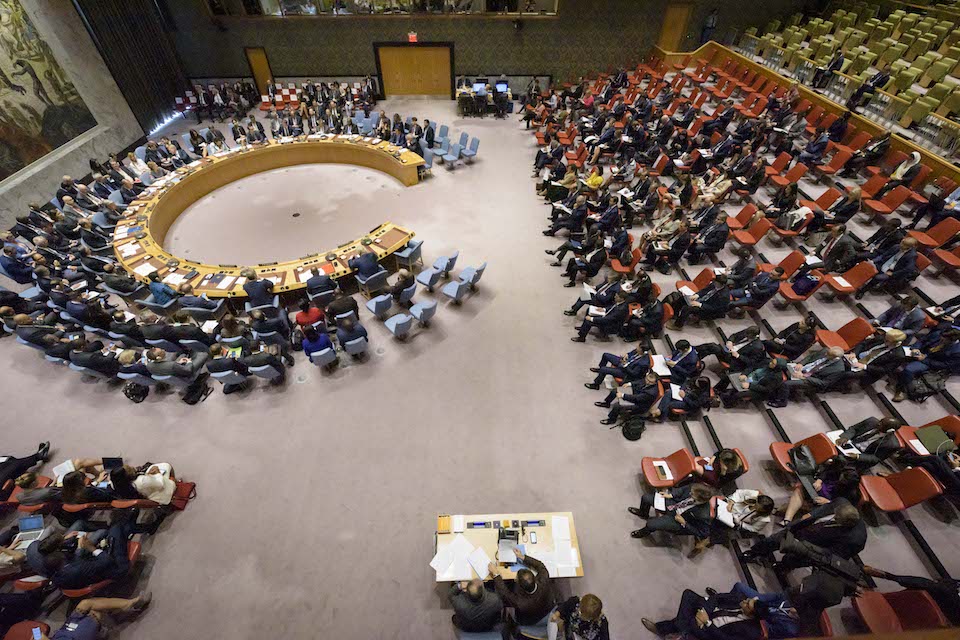International humanitarian law and counter-terrorism
Statement by Ambassador Karen Pierce at the Security Council debate on UN cooperation with regional/sub-regional organisations in maintaining peace and security.

I wanted to start by agreeing with what the French, German and Polish Ministers have said about the importance of international humanitarian law in this and, of course, about the work of other organisations which include, but are not limited to, the European Union, NATO and the OSCE – all of whom, as Ministers have explained, do very important work both on the prevention, protection and the combating terrorism agendas in this area.
For our part, the United Kingdom very much welcomes these counter-terrorism partnerships with regional and subregional organisations. And as terrorist threats evolve, cooperation between partners is vital to address cross-border movements of money, people, ideas and materials. However, as the Secretary-General affirmed this morning, such cooperation has to be anchored within the UN’s global counterterrorism strategy and the Security Council’s resolutions, and it has to reflect the balanced and comprehensive approach in compliance with international law, as outlined by both the Security Council and the General Assembly. And we fully agree with the Secretary-General that promoting gender equality, as ministers have also said, is an important component of countering terrorism and violent extremism.
The United Kingdom welcomed the Council’s recent adoptions of Resolutions 2462 and 2482, with their increased emphasis on the obligation to protect humanitarian activity. It’s important that regional partnerships and interactions reflect this obligation and that counter-terrorism measures are not used as a justification for ignoring this obligation, nor is it a justification for violating the Geneva Conventions or International Humanitarian Law more generally.
In this respect, we were pleased to hear that the Shanghai Cooperation Organisation has increased its attention on humanitarian assistance, and we hope that this will include the protection of humanitarian activity while countering terrorism.
If I can turn to Central Asia, terrorism remains a threat in Central Asia, which is, of course, a key area for this discussion. The attack in Tajikistan last August that caused the death of four foreign cyclists was an awful reminder of that threat. We welcome the work of the UN Regional Centre in Central Asia in implementing the UN Counter-Terrorism Frameworks and Security Council recommendations. We also welcome the engagement we’ve seen so far from Central Asian governments and we’d encourage them to cooperate more with each other and with UNRCCA, the UN Office of Counter-Terrorism and the Counter-Terrorism Executive Directorate. And in this regard, it was good that the briefers could tell us about stronger partnerships, but at the same time, I would like to stress the importance of a harmonised approach, including on designations.
We’ve also touched on Afghanistan and of course, this Council discussed Afghanistan recently. But to the rest of Asia, it has great potential, but faces great challenges. The UK is pleased to see the countries of Central Asia working together to support their neighbour, Afghanistan. Much has been said about the threat not only of extremism, but also of narcotics trafficking emanating from the country. While we should recognise those risks, it’s important not to overstate them. It’s the Afghan people themselves who suffer most at the hands of extremists. The international community, as well as regional partners, need to continue to work together – as indeed we have for many years – to support peace and stability in Afghanistan.
Turning to counter-terrorism cooperation, we hope that we will be able to continue to work together to prevent terrorism and violent extremism in all regions. Military and law enforcement measures alone will not suffice. As the German Minister said, we need to tackle the root causes. The United Kingdom, therefore, encourages all CT partners to strengthen collaboration with civil society and to ensure that gender and human rights considerations are always integrated across the full spectrum of CT efforts globally.
Finally, I would like to stress the importance of human rights. We welcome the affirmation from the briefers today on human rights. They are absolutely vital to this issue. The General Assembly and the Security Council have reaffirmed many times that the promotion and protection of human rights is a fundamental pillar of counter-terrorism. We have seen the violation of human rights and fundamental freedoms have in themselves often contributed to validating terrorist narratives and enabling recruitment. It’s particularly important in Central Asia, where progress made on human rights there is fragile and needs to be protected. It’s imperative that the countries of the region and UNRCCA cooperate with regional actors to ensure that counter-terrorism approaches comply with human rights obligations.
For our part, Mr President, the United Kingdom is active in Central Asia. We collaborate and coordinate with a range of international partners, as I mentioned at the beginning. Our priorities are regional security, good governance, human rights and prosperity. Our projects support these priorities and we emphasise inclusion, participation and support for those vulnerable to extremism ideologies. We emphasise the need for the countries of Central Asia to cooperate on cross-border issues and to increase engagement with the rules-based international system. Counter-Terrorism offers a good opportunity for both.
In conclusion, Mr President, thank you for the opportunity to share our views on this important peace and security issue and to shine a light on the region that is of increasing strategic importance.